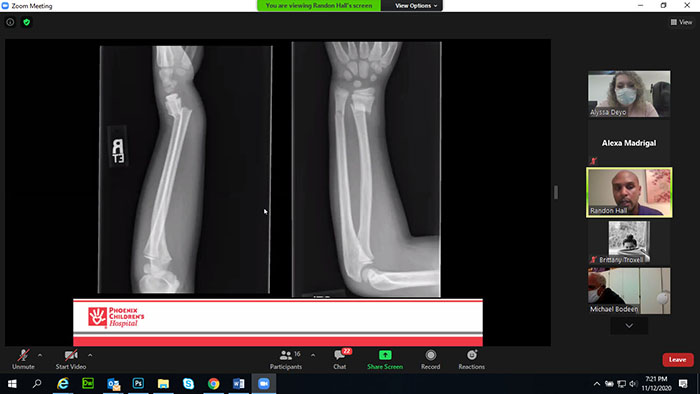
By Lana Sweeten-Shults
GCU News Bureau
It’s 7 p.m. on a Thursday and instead of binging Netflix, a smattering of Grand Canyon University health care students are scattered in a socially distanced way in the Technology Building anatomy lab, seated at long lab tables and visible to Dr. Randon Hall on a Zoom call.
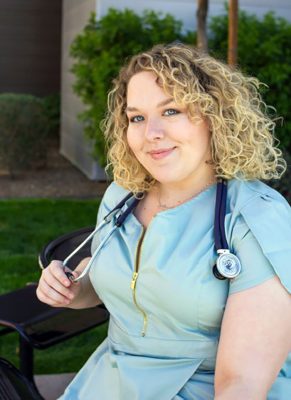
Other students are remotely attending Hall’s talk, the latest in the NERD Hours series created by junior biology/pre-med student Alyssa Deyo. She has connected with such groups as GCU’s chapter of HOSA – Future Health Professionals, mentored by Dr. Mark Wireman, and the Master Anatomy Program, mentored by Michael Bodeen, to reach as many pre-health students as possible.
Hall, an orthopedic physician at Phoenix Children’s Hospital, doesn’t waste any time launching into his guess-the-bone-break-and-suggest-a-treatment portion of his talk.
He shares his screen and an X-ray of a young patient who was thrown off a mechanical bull and fractured his wrist.
“What kind of injury is this?” he asks the students while presenting this particular case study.
After a flurry of answers via the comment section of Zoom, he bobs his head in agreement: “Yes, a distal radius fracture.”
“A lot of people say this has to be fixed,” said Hall. “But it doesn’t have to be. In young patients, you can leave this like this. As long as we can straighten it up a little bit, they should do OK.”
Then Hall opened the door to something personal.
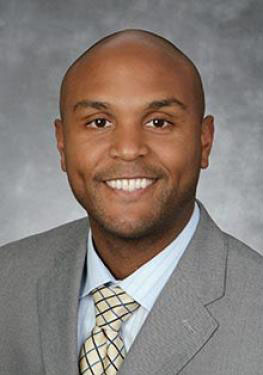
“This was one of the cases I saw early on in my career, when I started working, and I was losing sleep all over it. I was worried the kid’s arm was going to be crooked and terrible and just needed to be fixed, and so I called one of my older colleagues and they said, ‘Trust me, dude, it’ll be fine.’”
About six months later, “You could not tell the kid had any issue at all.”
It’s the kind of insight Deyo looks for from NERD Hours, which stands for Networking, Educational, Resources Done Online. The virtual series for pre-health students came about as a way for them to continue to connect with mentors and get real-life experiences, even during the pandemic.
“I know for myself and for others, the pandemic really hurt some of our hours for shadowing and for clinicals for pre-med,” Deyo said.
Pre-med students, pre-physician assistants, pre-physical therapy students and the like wanting to enter the health care field normally learn by shadowing a physician or landing an internship at a health care facility.
Deyo spent time last summer wondering how students would be able to talk to those key medical personnel anytime soon. "Then I thought to myself, you know, I’m a pretty smart girl. I can get some connections really quick.”
Self-starter that she is, she did.
She knew Hall from her high school, where he was the team physician and she assisted the athletic trainer. She also was one of Hall’s patients.
“Orthopedics is definitely one of those top-tier specialties," she said. "To get to talk to them (physicians) about their lifestyle, their day-to-life balance – stuff like that – it’s crucial for us so we can also understand, before we get to medical school, and start to weigh these decisions.”
Not that Deyo seeks only physicians in those top-tier specialties.
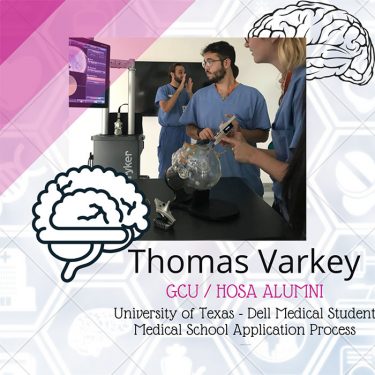
Medical students and GCU alumni Thomas Varkey, Zack Merhavy, Colton Zeitler and Cheney Huls all have spoken at NERD Hours about the application process.
"Even myself, when I first came to college, I was like, Oh, THIS is how much medical school costs, THESE are the different specialties. I didn’t know the whole extent of it. I wanted graduate students to sit down with us and tell us the reality, tell us the pricing, tell us what they’re learning.”
Varkey, adjunct faculty in the Colangelo College of Business and a third-year medical student at the University of Texas’ Dell Medical School, said it was a blast for him to get to speak to GCU students who are about to embark on the journey he’s currently taking.
“I was so glad to have been given the chance to provide practical advice I wish I had been given as an undergraduate.”
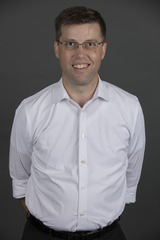
Another speaker, Dr. Jon Valla, Assistant Dean of Science in the College of Science, Engineering and Technology, spoke to the students about the letters of recommendation process and how students should go about developing the relationships they need for strong faculty recommendations for graduate school.
Valla said Deyo approached him in August about coming up with a way to help students replace their experiential hours, or those real-life experience and observation hours, that are harder to find because of the pandemic.
“While there essentially is no replacement for true experiential time,” Valla said, “Alyssa’s plan to bring in alumni and practitioners provides an invaluable service to our pre-health students. It’s to her credit that she has been able to routinely bring in speakers with a valuable perspective and have them share with her classmates.
“It also helps keep our famous GCU community alive, as well, giving students good cause to safely gather, learn some great information and be able to have casual but meaningful conversations with peers and future colleagues.”
Hall agreed.
“It is inspiring to see students take the initiative like this because they could have easily just used the current situation as an excuse to do less," he said. "I love the passion for learning, for getting better, for gaining experience. That is the characteristic you want to see in someone pursuing medicine.”
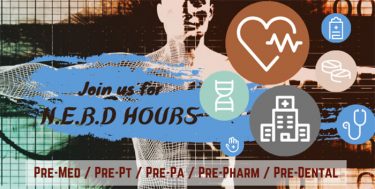
Deyo said another goal of the series is to help students network, “so we get our foot in the door, at least, so that we have them (physicians, medical students and other speakers) as a connection.”
Ultimately, she wants to find health care professionals for NERD Hours who love what they do and can share that with her and her classmates.
“I want to find physicians who are passionate,” she said. “If I’m reading articles about someone and they seem passionate about what they’re doing, I’m definitely reaching out to them.”
One of the fun parts of NERD Hours, Deyo added, is hearing speakers just talk, casually, about their work and nonwork lives.
Hall spoke about how you might not want to be a surgeon if you don't want phone calls at 2 a.m. Instead, you might want to become an orthopedic physician, like him. His work hours are 8 a.m. to 4 p.m. four days a week with one half day, along with working as a team physician for various high schools.
“I’m never on call. I don’t work any weekends, which is not the same for the surgeons,” he said.
Students at his NERD Hours talk wondered how hard medical school and his residency were.
“A lot of times I feel like people want to describe it in a way that ‘It was torture.’ But it wasn’t really torture,” he said. Though it was hard hours, as a resident, he got paid, and he got help from his fellow medical school students, who all were trying to reach their goals. “To me, it was more a community of like-minded people. We went to the gym, we had parties, we did all the fun stuff.”
In a way, no worries.
It’s that sense of camaraderie, in the end, that Deyo wants her fellow students to find in her NERD Hours series.
“Just because we’re speaking through a screen,” she said, “doesn’t mean we can’t have a heart-to-heart.”
Contact GCU senior writer Lana Sweeten-Shults at [email protected] or at 602-639-7901.
****
Related content:
GCU Today: Alumnus returns to help patients after COVID battle
GCU Today: GCU alumna's challenging med school journey
GCU Today: Pre-med students sharpen skills in mini-interviews



































































